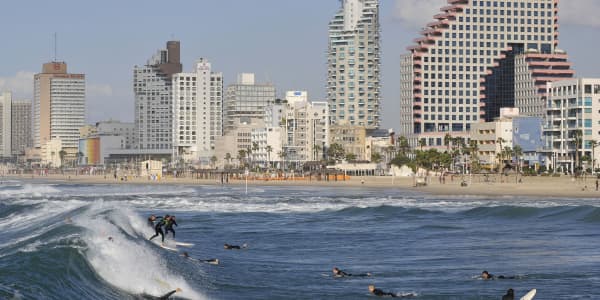Israel's high-tech industry is brimming with products that have made the jump from military application to civilian markets, both software and hardware, from cybersecurity to drones and from navigation to imaging. And the bigger the military reputation, the more impact the technology is likely to have.
One of the most iconic names currently in the arms industry is the air defense system Iron Dome that knocks rockets from Gaza out of the sky. Its success even helped revive the flagging career of the former Defense minister who commissioned the system over a decade ago, Amir Peretz. It was a theme in his campaign to recapture the Labor party leadership that earlier this week (Tuesday) saw him go through to a runoff.
The company that makes the command and control system at the heart of Iron Dome, mPrest, is making rapid inroads over the last few years into civilian applications for its systems, which seem made for the emerging internet of things (IOT).
Inevitably, its core function in Iron Dome gives mPrest a flying start when approaching global companies, whether it's in agriculture, electricity or anything else, says the company's co-founder and CEO, Natan Barak, who talked to CNBC in a phone interview.
"Definitely the reputation and the attention that we got after Iron Dome helps. We find companies outside of Israel that say 'if you've done Iron Dome, you can do anything'. It definitely helps credibility," Barak says cheerfully. He is proud of the company's role in Iron Dome and the work that the system is doing in "saving lives".
Iron Dome was first deployed in 2011 and Barak says that mPrest started looking at civilian commercial markets for its system a few years later: "We realized that we built a very sophisticated, comprehensive infrastructure for a command and control system and we can make a difference not only in defense but also in commercial applications."
While Iron Dome definitely serves as a high point for the company, it rests on a firm basis, says Barak: "We did many things before the Ministry of Defense and Rafael (Advanced Defense Systems) asked us to do the Iron Dome command and control system. We've done air defense for some countries in Asia, we've done border control in Asia, we've done many very sophisticated things."
The shift from only working for the defense and security markets to the commercial market did take some adjustment, Barak admits: "If you adopt such a model it changes the setup of the company dramatically, our sales and marketing changes dramatically, the launching of our products too."
The civilian market will be much bigger for mPrest eventually, he says but per project it's often smaller than what he's used to in the defense sector: "We used to work in multi-million dollar projects, tens of millions of dollars, and now when we talk about the commercial market, we're talking about mass production but each project might cost less."
The system that mPrest developed for Iron Dome appears to be a fit for the booming IOT market now that the price of sensors is coming down and connectivity is everywhere. The company is "integrating IT with the IOT", says Barak.
It has moved into the utilities business, for example providing the New York Power Authority with a monitoring, control and analytics system, and it's doing the same for New Zealand power company Vector, which is also interested in such things as being able to use customers' reserve battery power during peak times.
"The New York Power Authority engineers will always know much more about transformers than we do. What we're doing is giving them the capability to put their brain into the system without any software change," says Barak.
Utilities is one of the first fields mPrest moved into because the return on investments is rapid and can be clearly demonstrated, he explains. But it's by no means the only area that he's active in. He mentions smart cities, telecoms, fleet management and agriculture as just a few examples: "We are offering a platform that's so flexible that it can meet the challenge of the revolution that's happened with the IOT business."
Iron Dome does remain a big focus for the company and Barak says it is being exported to various countries, often places that don't want to give it a lot of publicity. Nor is it always the Iron Dome system the way it's being used in Israel, he says without elaborating.
As for the system's effectiveness against what Israel's intelligence assessments say is a mounting rocket threat, especially from Lebanon's Hezbollah, he's quietly confident: "I believe that we have closed a gap of many years from the air defense point of view and I hope we're never getting back to the situation where rockets are being fired on us from Lebanon or Gaza and so on. But we'll be capable of dealing with them."




